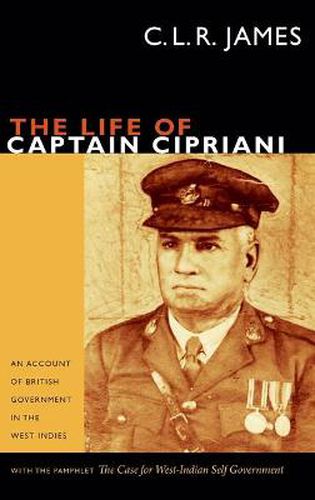Readings Newsletter
Become a Readings Member to make your shopping experience even easier.
Sign in or sign up for free!
You’re not far away from qualifying for FREE standard shipping within Australia
You’ve qualified for FREE standard shipping within Australia
The cart is loading…






The Life of Captain Cipriani (1932) is the earliest full-length work of nonfiction by the Trinidadian writer C. L. R. James, one of the most significant historians and Marxist theorists of the twentieth century. It is partly based on James’s interviews with Arthur Andrew Cipriani (1875-1945). As a captain with the British West Indies Regiment during the First World War, Cipriani was greatly impressed by the service of black West Indian troops and appalled at their treatment during and after the war. After his return to the West Indies, he became a Trinidadian political leader and advocate for West Indian self-government. James’s book is as much polemic as biography. Written in Trinidad and published in England, it is an early and powerful statement of West Indian nationalism. An excerpt, The Case for West-Indian Self Government, was issued by Leonard and Virginia Woolf’s Hogarth Press in 1933. This volume includes the biography, the pamphlet, and a new introduction in which Bridget Brereton considers both texts and the young C. L. R. James in relation to Trinidadian and West Indian intellectual and social history. She discusses how James came to write his biography of Cipriani, how the book was received in the West Indies and Trinidad, and how, throughout his career, James would use biography to explore the dynamics of politics and history.
$9.00 standard shipping within Australia
FREE standard shipping within Australia for orders over $100.00
Express & International shipping calculated at checkout
The Life of Captain Cipriani (1932) is the earliest full-length work of nonfiction by the Trinidadian writer C. L. R. James, one of the most significant historians and Marxist theorists of the twentieth century. It is partly based on James’s interviews with Arthur Andrew Cipriani (1875-1945). As a captain with the British West Indies Regiment during the First World War, Cipriani was greatly impressed by the service of black West Indian troops and appalled at their treatment during and after the war. After his return to the West Indies, he became a Trinidadian political leader and advocate for West Indian self-government. James’s book is as much polemic as biography. Written in Trinidad and published in England, it is an early and powerful statement of West Indian nationalism. An excerpt, The Case for West-Indian Self Government, was issued by Leonard and Virginia Woolf’s Hogarth Press in 1933. This volume includes the biography, the pamphlet, and a new introduction in which Bridget Brereton considers both texts and the young C. L. R. James in relation to Trinidadian and West Indian intellectual and social history. She discusses how James came to write his biography of Cipriani, how the book was received in the West Indies and Trinidad, and how, throughout his career, James would use biography to explore the dynamics of politics and history.